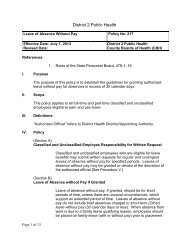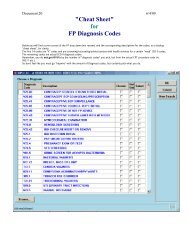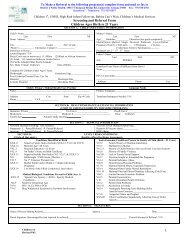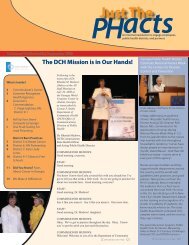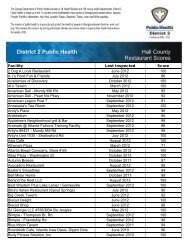E. coli infection reported by Stephens - District 2 Public Health
E. coli infection reported by Stephens - District 2 Public Health
E. coli infection reported by Stephens - District 2 Public Health
You also want an ePaper? Increase the reach of your titles
YUMPU automatically turns print PDFs into web optimized ePapers that Google loves.
<strong>District</strong> 2 <strong>Public</strong> <strong>Health</strong><br />
David N. Westfall, M.D., MPH, CPE, <strong>Health</strong> Director<br />
1280 Athens Street • Gainesville, Georgia 30507<br />
PH: 770-535-5743 • FAX: 770-535-5958 • www.phdistrict2.org<br />
Banks, Dawson, Forsyth, Franklin, Habersham, Hall, Hart, Lumpkin, Rabun, <strong>Stephens</strong>, Towns, Union and White Counties<br />
FOR IMMEDIATE RELEASE<br />
CONTACT: Dave Palmer, <strong>Public</strong> Information Officer<br />
DATE: May 17, 2013 PH: 770-531-5679 • FAX: 770-535-5958<br />
dbpalmer@dhr.state.ga.us<br />
E. <strong>coli</strong> <strong>infection</strong> <strong>reported</strong> <strong>by</strong> <strong>Stephens</strong> County <strong>Health</strong> Department<br />
The <strong>Stephens</strong> County health department, along with district and state public health, is investigating seven<br />
(7) cases of E. <strong>coli</strong> 0157 <strong>infection</strong>. Individuals began seeking medical care during the first week of May for<br />
symptoms of E. <strong>coli</strong>, which are stomach cramps, diarrhea (often bloody) and vomiting.<br />
Local and state public health continues to investigate the incident, but has not yet determined the source of<br />
the outbreak.<br />
E. <strong>coli</strong> <strong>infection</strong> generally occurs about 3-4 days after exposure. It often begins with mild stomach pain or<br />
diarrhea and worsens over several days. <strong>Public</strong> health urges residents who may experience these<br />
symptoms (stomach cramps, diarrhea, and vomiting) that last longer than normal (2-3 days) to seek advice<br />
from their medical provider.<br />
How is E. <strong>coli</strong> spread<br />
There are several ways people can become infected with E. <strong>coli</strong>. These include:<br />
Eating contaminated food,<br />
Drinking unpasteurized (raw) milk,<br />
Swimming in a lake or swimming pool that is contaminated and swallowing water,<br />
Contact with cattle,<br />
Contact with animals or objects at a petting zoo,<br />
Contact with human feces; when changing diapers or caring for someone who has diarrhea,<br />
Not washing hands properly after going to the bathroom.<br />
How can food become contaminated<br />
Meat may become contaminated during processing and must be cooked properly to kill the E. <strong>coli</strong> bacteria.<br />
Foods, such as raw vegetables can also be contaminated with the E. <strong>coli</strong> bacteria and must be<br />
washed thoroughly before eating raw or cooking.<br />
How to prevent E. <strong>coli</strong> <strong>infection</strong>.<br />
• WASH YOUR HANDS thoroughly after using the bathroom or changing diapers and before<br />
preparing or eating food. WASH YOUR HANDS after contact with animals or their environments (at<br />
farms, petting zoos, fairs, even your own backyard).
• COOK meats thoroughly. Ground beef and meat that has been needle-tenderized should be cooked<br />
to a temperature of at least 160°F/70˚C. It’s best to use a thermometer, as color is not a very reliable<br />
indicator of “doneness.”<br />
• AVOID raw milk, unpasteurized dairy products, and unpasteurized juices (like fresh apple cider).<br />
• AVOID swallowing water when swimming or playing in lakes, ponds, streams, swimming pools, and<br />
backyard “kiddie” pools.<br />
• PREVENT cross contamination in food preparation areas <strong>by</strong> thoroughly washing hands, counters,<br />
cutting boards, and utensils after they touch raw meat. To learn more about how to protect yourself<br />
from E. <strong>coli</strong>, see CDC’s feature, E. <strong>coli</strong> Infection.<br />
For more information about E. <strong>coli</strong>, visit http://www.cdc.gov/e<strong>coli</strong>/general/index.html



